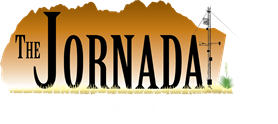Jornada Bibliography
Export 3600 results:
Filters: Target='_blank' is [Clear All Filters]
.
1944. A short-cut method for checking degree of forage utilization. Journal of Forestry. 42:294-295.
.
1938. Vegetational density and composition of black grama type ranges as influenced by semideferred grazing. USDA, Forest Service, Southwest Forest and Range Experimental Station, Research Note No. 35. :2.
.
1944. Measurement of grazing use by the line-interception method. Journal of Forestry. 42:192-194.
.
1928. Atmospheric electricity during sand storms. Science. 69:474-475.
.
1943. What is conservative grazing? The Cattleman. 29:16,18.
.
1936. How closely may black grama and tobosa grass be grazed year after year. The Cattleman. 23:15-18.
.
1948. Perennial grass composition as an indicator of condition of Southwestern mixed grass ranges. Ecology. 29:190-204.
.
1948. New grass for old. American Cattle Producer. 30:30-31.
.
1934. Stem structure of grasses on the Jornada Experimental Range. Botanical Gazette. 95:636-648.
.
1941. Application of the line interception method in sampling range vegetation. Journal of Forestry. 39:388-394.
.
1933. Solid and hollow stemmed grasses of the Jornada Experimental Range. Science. 78(2024):342.
.
1939. Maintaining the balance between summer and winter forage on black grama ranges under yearlong grazing use. :4.
.
1939. The effect of intensity and frequency of clipping on density and yield of black grama and tobosa grass. U.S. Department of Agriculture Technical Bulletin No. 681. :32.
.
1938. Vegetation on gypsum soils of the Jornada plain, New Mexico. Ecology. 19:572-577.
.
1938. Tentative range utilization standards; black grama (Bouteloua eriopoda). USDA, Forest Service, Southwest Forest and Range Experimental Station. :4.
.
1928. An improved pair of shears for clipping studies on quadrats. Ecology. 9:107-108.
.
1943. Progress in utilization standards for western ranges. Journal of the Washington Academy of Sciences. 33:161-169.
.
1935. Management of black grama ranges. American Hereford Journal. 26:74-76.
.
1975. Improved Range Plants. Society for Range Management, Range Symposium Series, No. 1. :96pp.
.
1935. After the drought. The American Cattle Producer. 17:3-5.
.
1934. The occurrence of Gutierrezia sarothrae on Bouteloua eriopoda ranges in southern New Mexico. Ecology. 15:49-61.
.
1933. Partial phyllody of Yucca elata. The Botanical Gazette. 94:619-620.
.
1940. Range management research methods in the western United States. Herbage Reviews. 8:121-138.
.
1932. Growth and reproduction of Yucca elata. Ecology. 13:364-374.
.
1931. Plant succession and grazing capacity on clay soils in southern New Mexico. Journal of Agricultural Research. 43:1027-1051.
.
1939. How to keep and increase black grama on Southwestern ranges. U.S. Department of Agriculture, Leaflet No. 180. :8.
.
1929. Conservative grazing, a paying policy. The Cattleman. 16:32-33.
.
1929. A case of phyllody in Yucca elata. Botanical Gazette. 88:109-110.
.
1929. Soapweed. New Mexico College of Agriculture and Mechanic Arts and Agricultural Experiment Station, Press Bulletin 577. :1.
.
1929. Vegetative succession in the Prosopis sand dunes of southern New Mexico. Ecology. 10:392-398.
.
2007. Rodent community landscape ecology in grassland-shrubland ecotones and gradients in the Chihuahuan Desert. 22nd Annual Symposium of U.S. Regional Chapter of International Association of Landscape Ecology. :p.21.
.
2007. Complexity in rodent community respones to grassland-shrubland trasititions. 87th Annual Meeting American Society of Mammalogist. :p.89.
.
2006. Landscape variation in desert rodent community response to grass-shrubland ecotones. 21st Annual Symposiumof the United States Regional Chapter of the International Association of Landscape Ecology. :PaperNo.11.
.
1997. Methods for assessing soil aggregation in noncultivated arid and semiarid soils. Annual Meeting, American Society for Agronomy. :279.
.
2001. Introduction. CATENA. 44:25-26.
.
1989. Root Systems. Physiological Plant Ecology. :367-398.
.
2005. Nighttime transpiration and nutrient acquisition: Is there a benefit of losing water at night? Ecological Society of America.
.
2022. Studying the impacts of dust emission and dust deposition on snow over the Upper Colorado River Basin using the WRF-Chem-CTSM coupled framework. AGU22 FALL MEETING.
.
1975. Factors affecting dystocia in range beef heifers. :68.
.
1974. Competitive relationships of the Common and Lesser Nighthawks. The Condor. 76:1-20.
.
2005. Microbial crust CO2 response to precipitation on the Jornada Experimental Range. Ecological Society of America, 90th Annual Meeting. :91.
.
2003. Hydrologic input, nutrient and pollutant budgets, and biotic components of the North Caspian Sea. 17th Biennial Meeting of the Estuarine Research Federation.
.
2019. Using machine learning to model complex landscapes: predicting the geographic range of Vesicular Stomatitis across the western United States. Ecological Society of America Abstracts.
.
2020. Harnessing the power of AI technologies for ecology: Grass recovery in shrub dominated landscapes. Ecological Society of America.
.
2015. Explaining abrupt spatial transitions in agro-ecosystem responses to periods of extended drought. 2015 LTER All Scientists Meeting.
.
2018. Invasive Plant Expansion on Spatially Heterogeneous Landscapes: Hot Spots and Hot Moments. Ecological Society of America.



